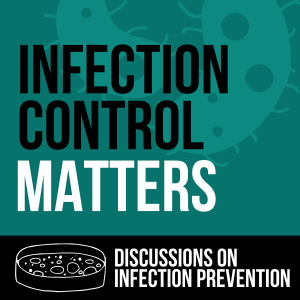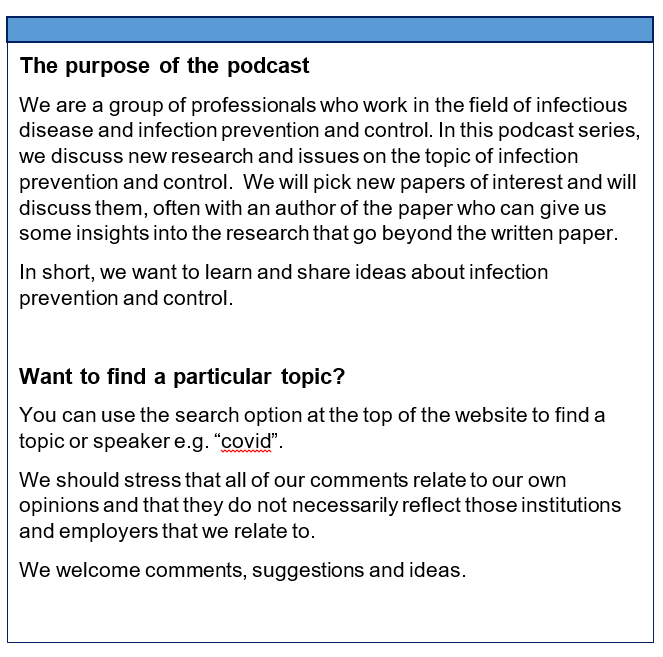Infection Control Matters
We are a group of professionals who work in the field of infectious disease and infection prevention and control. In this podcast series, we discuss new research and issues on the topic of infection prevention and control. We will pick new papers of interest and will discuss them, often with an author of the paper who can give us some insights into the research that go beyond the written paper. Authors will include nurses, doctors, academics, clinicians, administrators and leaders. We should stress that all of our comments relate to our own opinions and that they do not necessarily reflect those institutions and employers that we relate to. We welcome comment, suggestions and ideas. Please consider subscribing for updates and to find collections of topic specific podcasts at www.infectioncontrolmatters.com
Episodes

40 minutes ago
40 minutes ago
In this podcast, Phil and Brett speak with Dr Lyn-Li Lim from VICNISS (Victorian Healthcare Associated Infection Surveillance System)in Australia. Dr Lim and colleagues recently explored the infection prevention and control resourcing levels in 113 facilities, including FTE per 100 beds. This podcast explores the differences in resourcing for different categories of hospitals.
A link to the publication is here. https://www.sciencedirect.com/science/article/pii/S019665532500570X

Wednesday Jan 28, 2026
Wednesday Jan 28, 2026
In this episode, Martin Kiernan talks to Dr Sarah Fieldhouse, Associate Professor of Forensic Science and Dr Emmanuel Babafemi, Senior Lecturer in Biomedical Sciences both of the University of Staffordshire, UK. We discuss a recent paper looking at hospital cleanliness. Using forensic light, the study uncovered invisible contamination on surfaces that looked clean to the naked eye. We discuss what fluorescence reveals, what ATP misses, and how this approach could reshape environmental monitoring in healthcare.
The open access paper is available here:Fieldhouse S, Bastaki BB, Ledgerton A, Clarke P, Lewis T. Assessing the effectiveness of hospital cleaning using fluorescence: a proof-of-concept study and comparison with ATP testing. J Hosp Infect 2025;166:38-45. https://doi.org/10.1016/j.jhin.2025.08.008.
https://www.journalofhospitalinfection.com/action/showPdf?pii=S0195-6701%2825%2900267-1

Wednesday Jan 14, 2026
Wednesday Jan 14, 2026
In this episode, Martin talks to Dr Diane Ashiru-Oredope and colleagues at the UKHSA (UK Health Security Agency) about the 2025 ESPAUR report, focusing on what the latest data mean for clinicians, infection prevention teams, and health system leaders. We explore what the latest data reveal about antimicrobial resistance and prescribing trends in England, including changes in resistance patterns among major bacterial pathogens and what this means for patient safety and clinical outcomes.
We discuss what’s improving, where challenges remain, and how infection prevention and antimicrobial stewardship teams can use national surveillance data to drive meaningful local action.
You can download the report in it's entirety here:https://assets.publishing.service.gov.uk/media/6936ac34b612700b2cb73607/ESPAUR-report-2024-to-2025.pdf
There is also a supplement and summary in the Journal of Antimicrobial Chemotherapy which can be accessed here:https://academic.oup.com/jacamr/issue/8/Supplement_2
The TARGET antibiotics toolkit hub is abailable here:https://elearning.rcgp.org.uk/course/view.php?id=553
e-Bug is available here: https://www.e-bug.eu/

Wednesday Dec 17, 2025
Wednesday Dec 17, 2025
This is our traditional end of year Christmas special. In this episode we consider highlights from year and have a bit of fun - including a stakeout in London.
We talk about our views on the most significant systematic review, our favourite presentation/poster, RCTs would like to see and predictions for 2026.

Wednesday Dec 10, 2025
Wednesday Dec 10, 2025
In this episode, Martin talks to Dr Jon Otter, Director of Infection Prevention and Control at Guy's and St Thomas' Hospital in London, UK. We examine two complementary pieces of work that provide further insight into Candidozyma auris transmission in acute hospitals. The first demonstrates, for the first time in the UK, that ward-level wastewater reliably mirrors patient colonisation and can reveal genetically related outbreak strains using culture and PCR. The second, a case–control study, identifies clinical and environmental risk factors that shape colonisation, highlighting the significance of shared patient equipment.
The paper can be found here: Davidson HC, Griffin AE, Symes L, Laing KG, Witney AA, Gould K, et al. Detection of Candidozyma (formerly Candida) auris from ward wastewater during an outbreak using culture and molecular methods. J Hosp Infect 2025. https://doi.org/10.1016/j.jhin.2025.10.024
A copy of the poster can be downloaded here

Wednesday Nov 26, 2025
Wednesday Nov 26, 2025
In this episode, Martin speaks with Helen Dunn, Consultant Nurse at Great Ormond Street Hospital, a Children's Hospital in London, UK. Helen is the lead author of a recent study published in the Journal of Infection Prevention, exploring whether structured ward rounds can be used as an innovative method for delivering Infection Prevention and Control education directly in the clinical environment. This work implemented a bedside ward-round model with Band 6 nurses in a paediatric cardiac high-dependency unit, using a structured assessment tool to prompt real-time, patient-focused discussions. The findings highlight that this approach created frequent education opportunities, strengthened relationships between clinical teams and IPC practitioners, and reduced the number of IPC interventions required over time.
Dunn H, Blackburn P, Cloutman-Green E. Can ward rounds be used by infection prevention control teams to deliver education and enhance knowledge to clinical staff. J Infect Prev 2025;26(6):17571774251366930. https://doi.org/10.1177/17571774251366930.
Article on Schulman's Signature Pedagogies here

Wednesday Nov 12, 2025
Wednesday Nov 12, 2025
In this episode, Martin spoke to the authors of two compelling posters showcased at the 2025 Infection Prevention Society Conference in Brighton, each discussing practical, data-driven approaches to reducing avoidable harm. Download the posters and have a listen to two authors with a passion for their projects.
First, Catherine Lemsalu, a Dental Nurse from the IPC Team at University Hospital Plymouth discusses her quality-improvement work on an acute stroke ward, demonstrating how structured mouth-care assessment, targeted staff education, and consistent daily oral care contributed to reductions in non-ventilated hospital-acquired pneumonia and Clostridioides difficile infections. Her poster highlights how simple, early interventions—done well—can strengthen antimicrobial stewardship, improve patient outcomes, and build ward-level capability through mouth-care champions.
We then explored the development of a national surveillance framework and digital tool for vascular access device–related bloodstream infections (VAD-BSI) with Sue Rowlands from The Royal Wolverhampton NHS Trust. Their multidisciplinary initiative has created a standardised, user-friendly approach to classifying VAD-BSI, identifying risk factors, and generating automated visual outputs that support local reporting, audit, and education. Early pilot data show strong usability, enhanced insight into bloodstream infection epidemiology, and meaningful impact on line-care practice.
Posters can be downloaded here:
Reduction of hospital-acquired pneumonia and Clostridioides difficile infections through focused line care
Developing a surveillance framework and digital tool for Vascular Access Device-Related Bloodstream Infections (VAD-BSI): improving patient safety through local data and national insight

Wednesday Oct 29, 2025
Wednesday Oct 29, 2025
In this episode, Brett and Martin discuss a few posters that interested them from recent major infection prevention conferences.Brett was at the ICPIC Conference in Geneva and found plenty of interest in the Innovation academy.
Tracing hand pathogen transmission with and without hand hygiene with a newly developed DNA-encapsulating Lipid Nanoparticle system
Innovative FFP2 procedural mask for safer high-risk procedures
A new medical mask made of filtering, transparent and ecofriendly material
AI for healthcare-associated infection
Martin was on his travels as well and recorded a few discussions with poster presenters at the 2025 Infection Prevention Society conference at Brighton in the south of the UK (more in the next episode). On this occasion he spoke to Frances Butson from the IPC Team at Gloucester Hospitals NHS Foundation Trust in the UK. We discussed a new approach to providing the hospital board with assurance of best practice by having 'bottom-up' local assessments rather than using a more traditional IPC team approach. Additionally, to foster better communications in the organisation the team there have a local podcast called IPC In Action, which can be found here: https://shows.acast.com/ipc-in-action-podcast and also on Youtube etc.
The poster can be found here:

Wednesday Oct 15, 2025
Wednesday Oct 15, 2025
In this episode, Martin Kiernan hosts a panel discussion at the 2026 Infection Prevention Society Conference in Brighton, United Kingdom.
The Panel comprised:
Dr Stephane Bouchoucha, Associate Professor in Nursing and Associate Head of School (International) in the School of Nursing and Midwifery at Deakin University in Melbourne, New South Wales Australia. Stephane is the current President of the Australasian College of Infection Prevention and Control
Dr Mark Garvey, Consultant Clinical Scientist in Microbiology and Deputy Director of Infection Prevention and Control for the Infection Prevention and Control Service at University Hospitals Birmingham NHS Foundation Trust (UHB)
Kerry Holden, Lead Nurse and Deputy Director of Infection Prevention and Control at Gloucestershire Hospitals NHS Foundation Trust in the UK. Kerry is the current IPS Vice-President.
Dr Maura Smiddy, Director of the MSc in Infection Prevention and Control at University College Cork in Ireland and Chair of the IPS Research and Development Group.
Lorraine Williams, Deputy Director of Infection Prevention & Control and Lead Nurse for IPC. Lorraine is a former IPS Vice-President.
Topics we discuss include:
Why are infection rates not falling?
What can be done to reduce infections in long-term care that require readmission to hospital
If each panel member were given £1,000,000 for an implementation, what would they do?
If each panel member had to stop doing something that the infection prevention team currently does, what would that be?

Wednesday Oct 01, 2025
Wednesday Oct 01, 2025
In this podcast, Brett and Phil have a chat with Professor David Weber on the sidelines of the ICPIC conference in Geneva. We chat about the funding cuts for the WHO and the US CDC, including the disbandment of HICPAC - and what this means for IPC. We discuss what is being done and what needs to happen to fill the void and to ensure contemporary IPC evidence and guidelines are available.
Prof Weber, a distinguished leader in infection prevention and healthcare epidemiology, is the current President of the Society for Healthcare Epidemiology of America (SHEA). Prof Weber has also held many leadership and committee roles, including with HICPAC.

About us and contact
Feel free to contact us with suggestions on topics and or speakers. Use Twitter to contact any one or all of us:
Brett Mitchell @1healthau (Twitter link)
Martin Keirnan @emrsa15 (Twitter link)
Deb Friedman @friedmanndeb
Phil Russo: @PLR_aus (Twitter link)

Martin Kiernan: Martin is a highly experienced nurse who has worked in the field of infection prevention and control since 1990 in the acute hospital community and, more recently, in academic and industry settings with GAMA Healthcare. Martin's reputation as a research collaborator is recognised both nationally and internationally. Martin’s involvement in professional organisations such as the Infection Prevention Society and the Healthcare Infection Society has enhanced his reputation as a key opinion leader, teacher, leader, and researcher. As a result, he has been invited to act in leadership and mentoring roles to support his colleagues throughout the world in terms of infection prevention.

Professor Brett Mitchell: Brett is a Professor of Nursing with over 150 peer reviewed journal and oral conference presentations, authored several books, and has been an invited speaker at numerous infection prevention and control conferences in Australia and internationally. He is a Fellow of the Australasian College for Infection Prevention and Control and the Australian College of Nursing. Professor Mitchell is also Editor-in-Chief of Infection, Disease and Health. Professor Mitchell has experience leading nursing teams, research teams and infection prevention and control teams in both Australia and the United Kingdom. Further details: https://www.newcastle.edu.au/profile/brett-mitchell

Associate Professor Philip Russo: Phil is Director of Research, Nursing and Midwifery, Faculty of Medicine, Nursing and Health Sciences, Monash University, Victoria, Australia and Director of Nursing Research, Cabrini Health. A/Prof. Russo is the Past President of the Australasian College for Infection Prevention and Control. He has worked in both state and national positions, notably leading the establishment of the VICNISS Surveillance Program in Victoria followed by overseeing the successful implementation of the National Hand Hygiene Initiative sponsored by the Australian Commission for Safety and Quality in Health Care. Recently he has been an advisor at both a State and National level in the pandemic response. Further details: https://research.monash.edu/en/persons/philip-russo







